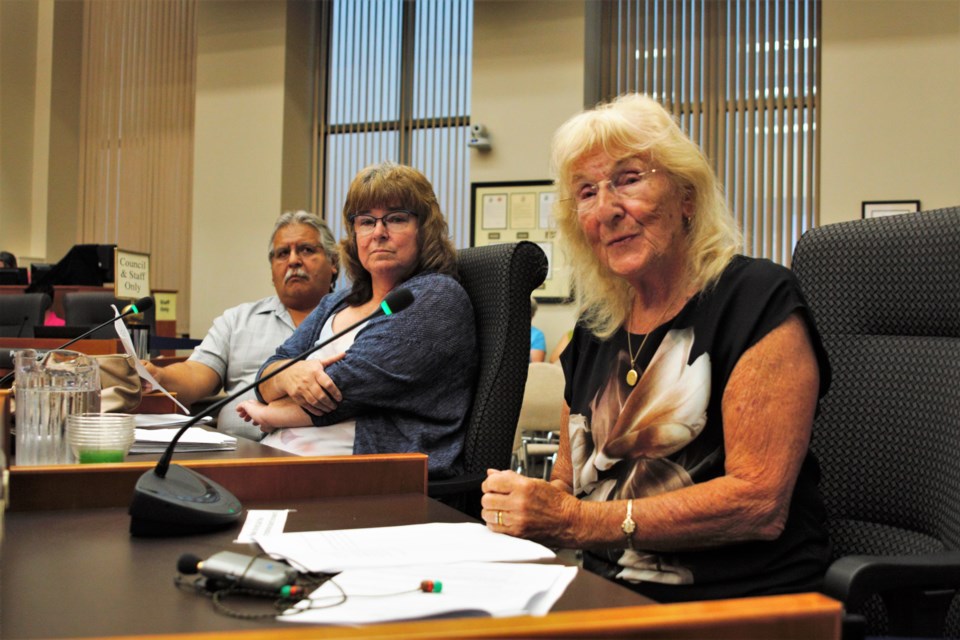THUNDER BAY — A controversial proposal to sell a city-owned mobile home park remains on the table after city council voted to receive more information on the issue.
Residents at Hillcourt Estates will now wait until March of next year to learn whether the city will move forward with a sale.
Council made the decision on a narrow 7-5 vote after a debate charged with concerns over the availability of affordable housing in the city.
Hillcourt residents have vocally opposed a sale, submitting a petition bearing over 400 signatures.
Presenting to council on Monday alongside other residents, Mandy Bruyere called municipal ownership a win-win, providing security for those who live there and roughly $170,000 in yearly profit for the city.
“Hillcourt satisfies a niche housing market for mostly seniors and young residents who prefer to own their own homes on a fixed or modest income,” she said.
“This is affordable housing, a safe community, and makes a profit annually for the city. Each year, the six-figure profits from Hillcourt help pay for other city programs, therefore helping all tax payers.”
The 89-unit mobile home park, located off of Rosslyn Road in the Neebing area, opened in 1976 and was taken over by the city in 1994 after a tax default.
Residents have organized against previous moves to consider selling, most recently in 2012, raising concerns a private owner could cut maintenance or close the park to pursue other forms of development.
Coun. Trevor Giertuga, who requested the report on a possible sale, argued residents have little to fear.
“We’re making over $170,000 a year, so if any private developer would come in, I imagine they would maintain their asset the same way we would,” he said.
Giertuga has argued the city may be able generate similar revenues by selling the property and investing the proceeds.
“My numbers I can come up with in my head have us sitting at maybe the same amount if we sold and invested, if not a little bit more,” he said.
Coun. Andrew Foulds expressed skepticism.
“If we go down this path of selling it… there are all kinds of assumptions that we’re going to keep that in the piggy bank forever,” he said. “Let’s not be naïve… It’s one-time revenue, a couple of years of investment, then it’s going to get spent, and we'll lose that revenue.”
Coun. Rajni Agarwal said residents have an example of successful private ownership literally in their backyards in the form of the neighbouring Vestavale Estates mobile home park.
“Vestavale is privately owned, and they’re maintained nicely,” she said. “Most investors don’t want to disturb their existing tenants… because then you have issues with the Landlord Tenant Act.”
Other councillors expressed less confidence.
Coun. Shelby Ch’ng asked “what would be stopping a developer from… removing all of their homes, subdividing it, and then selling it off?”
Director of development services Joel DePeuter said residents’ existing leases “would provide a level of protection” and major changes to the property would require some city approvals, but suggested discussing details in closed session.
Agarwal suggested the city could include conditions like long-term leases for existing residents in a sale.
Given the revenue it produces, Foulds argued it made little sense to sell Hillcourt.
“We continue to talk about new revenue streams and trying to find them,” he said. “This is a revenue stream. This is an investment with little risk. It’s an investment in affordable housing.”
“I think by supporting this, it’s going to cause more distress until March. I don’t see a problem with this, and if it’s not broken, why are we putting the people who live there through the ringer?”
Regardless of the financial questions, some councillors argued the city simply shouldn’t be “in the landlord business.”
“Normally we dispose of those assets, otherwise we become landlords of the citizens we represent, and I don’t think that’s the intent of a municipal government,” said Coun. Mark Bentz.
“I can understand the angst of the residents… These 89 residences have a bit of a good thing going, and I wouldn’t want to lose that either, if I had the city as a landlord. But around this table, we have to look at the finances and what businesses we should be in.”
Coun. Greg Johnsen, whose Neebing ward includes the park, questioned that logic.
“We are in this business,” he said. “We own malls, we own office space, golf courses, a telecommunications business, an electricity provider. We have a unique portfolio.”
Ch’ng said it made little sense to divest of Hillcourt amid a shortage of affordable housing options she said constitutes a crisis.
“We’re told we’re not in the housing business, that we shouldn’t be providing housing – we’re just in the business now of providing parks for people to set up tents so they can live,” she said.
“This is not a time to be selling affordable housing – yes, it’s market rent, but… these are generational homes, rent is low.”
Coun. Michael Zussino suggested residents themselves could be a potential buyer, asking if they’d be interested in pursuing a co-operative ownership model.
Bruyere responded the idea has been discussed, but suggested it could require up-front investments larger than what lower-income residents could afford.
Mayor Ken Boshcoff, meanwhile, suggested the District of Thunder Bay Social Services Administration Board should take on the property.
Council directed administration to report back by March 2024 with a recommendation on whether to sell Hillcourt Estates, along with information on future liabilities and other financial details.
